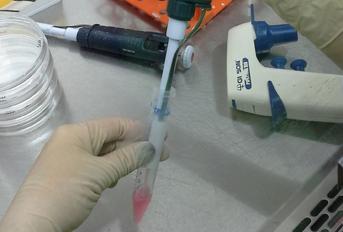Associação Portuguesa de Investigação em Cancro
Inibição do transporte de lactato como estratégia para tratamento do cancro de mama
Inibição do transporte de lactato como estratégia para tratamento do cancro de mama

Sabe-se que grande parte dos tumores apresenta acidificação do microambiente tumoral devido à produção de lactato. Consequentemente, o lactato formado é transportado por moléculas designadas de transportadores de monocarboxilatos (MCTs), que sabemos estarem envolvidas na progressão tumoral. Neste trabalho, avaliamos o efeito que a inibição destas moléculas provocou em células humanas de cancro de mama. Descobrimos que, nas células mais sensíveis, a inibição do transporte de lactato levou à diminuição da proliferação celular, migração e invasão, e ainda aumentou a morte celular. Estes resultados foram validados utilizando uma abordagem mais específica, o silenciamento do gene do MCT1. Os resultados obtidos neste trabalho levam-nos a propor a inibição do transporte de lactato como uma boa estratégia para o tratamento do cancro de mama, especialmente do subtipo basal, que atualmente não apresenta nenhuma terapia molecular específica.
Autores e afiliações:
Filipa Morais-Santos1,2, Vera Miranda-Gonçalves1,2, Sílvia Pinheiro1,2, André F Vieira3, Joana Paredes3, Fernando C Schmitt3,4,5,6, Fátima Baltazar1,2,* and Céline Pinheiro1,2,7,*
1 School of Health Sciences, Life and Health Sciences Research Institute (ICVS), University of Minho, Campus of Gualtar, Braga, Portugal
2 ICVS/3B’s – PT Government Associate Laboratory, Braga, Guimarães, Portugal
3 IPATIMUP – Institute of Molecular Pathology and Immunology, University of Porto, Porto, Portugal
4 Medical Faculty, University of Porto, Porto, Portugal
5 Department of Laboratory Medicine and Pathobiology, Faculty of Medicine, University of Toronto, Toronto, Canada
6 Department of Pathology, University Health Network, Toronto, Canada
7 Barretos School of Health Sciences, Dr. Paulo Prata - FACISB, Barretos, Sao Paulo, Brazil
*(F Baltazar and C Pinheiro contributed equally to this work)
Abstract:
The tumour microenvironment is known to be acidic due to high glycolytic rates of tumour cells. Monocarboxylate transporters (MCTs) play a role in extracellular acidification, which is widely known to be involved in tumour progression. Recently, we have described the upregulation of MCT1 in breast carcinomas and its association with poor prognostic variables. Thus, we aimed to evaluate the effect of lactate transport inhibition in human breast cancer cell lines. The effects of α-cyano-4-hydroxycinnamate, quercetin and lonidamine on cell viability, metabolism, proliferation, apoptosis, migration and invasion were assessed in a panel of different breast cancer cell lines. MCT1, MCT4 and CD147 were differently expressed among the breast cancer cell lines and, as expected, different sensitivities were observed for the three inhibitors. Interestingly, in the most sensitive cell lines, lactate transport inhibition induced a decrease in cell proliferation, migration and invasion, as well as an increase in cell death. Results were validated by silencing MCT1 expression using siRNA. The results obtained here support targeting of lactate transport as a strategy to treat breast cancer, with a special emphasis on the basal-like subtype, which so far does not have a specific molecular therapy.
Revista: Endocrine-Related Cancer
Link: http://erc.endocrinology-journals.org/content/21/1/27.abstract




